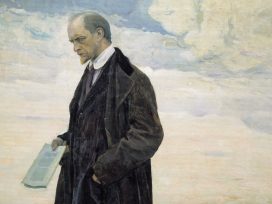Ukraine: an opportunity for Europe
There are moments in history when one must think broadly and ambitiously. To secure democracy in Ukraine is certainly in the interest of the European Union, writes Timothy Snyder. It is also a test for a Europe that wishes to play a role in the world.
More than Yugoslavia in the last decade, more than Turkey in the decade to come, Ukraine today is the test for Europe. Ukraine is an important European country, with a long border with the European Union, where nothing less than democracy is at stake in a peaceful revolution. The protests of the democratic opposition in Ukraine are like nothing seen in Europe since 1989. By every reasonable estimation, the democratic reformer Viktor Yushchenko has won the presidential election. According to mounting evidence, his opponent, the sitting prime minister, was complicit in massive electoral falsification. The European Union and its member states must take a clear stand for a peaceful resolution of this conflict that endorses the will of the Ukrainian people.
It is worrying for Europe that Russia believes it can intervene in Ukrainian politics, and in effect choose the president of Ukraine. President Vladimir Putin intervened openly in the election campaign, twice visiting Ukraine to back his candidate. Putin has in effect told the world that only elections won by his candidate would be democratic. But democracy is not about the preferences of outside leaders, it is about a process. This process was abused in Ukraine, in all likelihood with Russian funding, and certainly with the help of Russian advisors. As of this moment, President Putin and the dictatorial President Lukashenko of Belarus are the only leaders to have congratulated Prime Minister Viktor Yanukovitch, declared the victor after an obviously fraudulent tally.
Russia is making a mistake. Such interference in Ukrainian affairs will require, over the long run, the use of military force. Unconfirmed reports from Kiev indicate that Russian special forces have entered Ukraine. If this is true, this would be a horrible miscalculation by the Russian leadership. Russia cannot control a country of fifty million people, the vast majority of whom care of about their own independence, without destroying itself. Russian soldiers in a foreign country shooting foreign civilians would be a catastrophe for all concerned, perhaps especially Russia. Rather than supporting his man come what may, President Putin should join the call for peaceful discussions and negotiations. He still has time to take a position in line with the international consensus. This is a point that the European Union and its member states must make to Russia now.
Important as it is to prevent such a disaster, the European Union has a larger role to fill than diplomacy with Russia. The European Union is a center of democracy in the world. If Europe is to be a power of any kind, even a regional power, it must have some influence upon its neighbors, especially its immediate European neighbors. It must translate its enormous economic power and cultural appeal into foreign policy. Now is the time to try. There are moments in history, as in 1945 throughout western Europe, as in 1975 in Spain, as in 1989 throughout eastern Europe, as in Ukraine today, when one must think broadly and ambitiously. To secure democracy in Ukraine is in the interest of the European Union, because democratic neighbors are peaceful and prosperous neighbors. It is also a test for a Europe that wishes to play a role in the world. Yet above all democracy is also a goal which Europe must pursue if it is to be true to itself.
Published 26 November 2004
Original in English
Contributed by Transit © Timothy Snyder Eurozine
PDF/PRINTNewsletter
Subscribe to know what’s worth thinking about.




